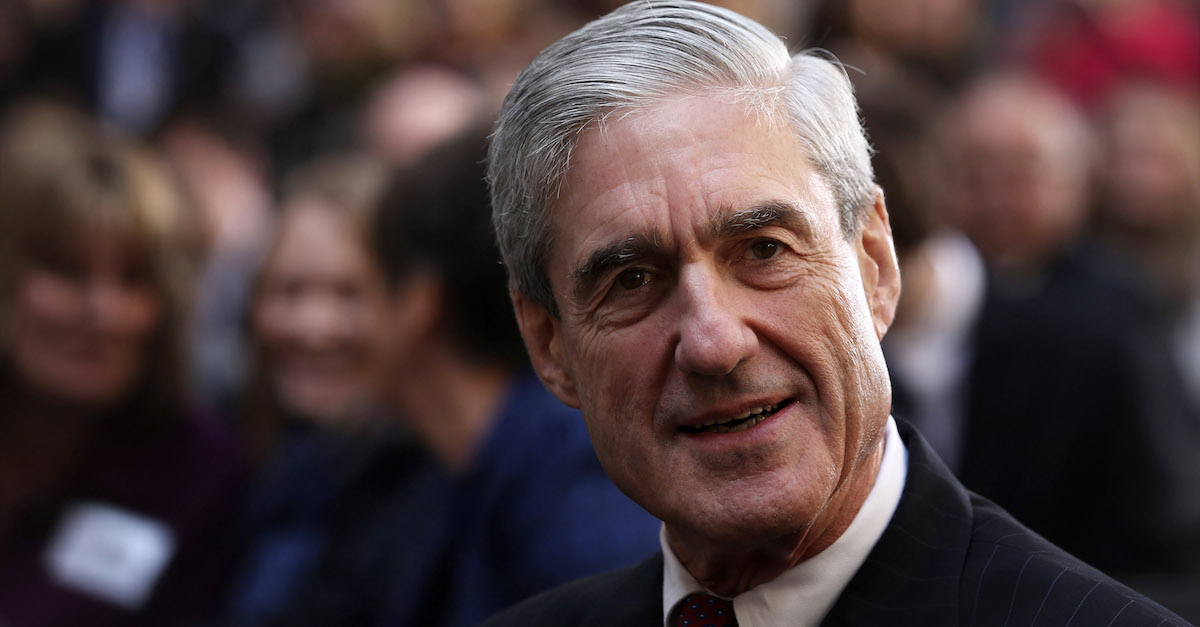
Perhaps the most notable aspect of last Friday’s high-profile, early morning arrest of long-time Trump confidant Roger Stone was that Stone was not being charged with conspiracy, which is the relevant crime that covers any potential illegal collusion. Indeed, Stone was charged for obstruction of an official proceeding, five counts of making false statements, and one count of witness tampering. Is this the extent of Stone’s alleged criminality or will it get worse — and if it’s going to get worse, why hasn’t Special Counsel Robert Mueller just charged him already? Legal experts are now explaining why Mueller could be holding back.
George Washington University Law Prof. Randall Eliason, for his part, penned a column for the Washington Post in which he took stock of the fact that Stone was not charged with conspiracy for his communications about WikiLeaks and the desire for dirt on the Hillary Clinton campaign that was allegedly hacked by the Russians. Eliason noted “that the indictment does not allege any kind of agreement or coordination between Stone or the campaign and WikiLeaks.”
Instead, “It portrays the campaign as primarily seeking information about actions that WikiLeaks was already planning. If that’s all it was, learning that information and failing to disclose it is deplorable but likely not criminal.”
Law&Crime’s Ronn Blitzer similarly noted that the Stone indictment left a hole in the collusion theory:
The collusion theory would have you believe that the Trump campaign was at the top of an operation where they worked with Russia in acquiring the emails, which were then given to WikiLeaks, who published them online. The Stone indictment seems to show the opposite, where Russia hacked the emails, gave them to WikiLeaks, who then communicated with Stone through intermediaries, with the Trump Campaign being the last to have information about it.
Eliason further argued that “If Mueller had a legal theory and evidence that made Stone’s contacts with WikiLeaks on behalf of the campaign a crime, it’s not clear why he wouldn’t charge it at this point. It’s possible he has some tactical reason for holding back. But the allegations are certainly no longer a secret, and it seems unlikely that Mueller is relying on someone with Stone’s credibility issues to cooperate and break the case wide open.”
While Eliason did allow for the possibility that there’s a tactical reason for Mueller to start small on the charge front, these lines did receive a bit of pushback from long-time federal prosecutors.
Former Assistant U.S. Attorney Mimi Rocah argued that there were three good reasons for Mueller to take this slow: 1) Start with the basic charges and see what you get after executing your search warrants; 2) Don’t trigger discovery on the most damning evidence; 3) If there are other conspirators, it would be wise to charge them all at once.
Former federal prosecutor Elie Honig, now a CNN analyst, told Law&Crime that Rocah’s response to Eliason makes a great deal of sense, from a prosecutor’s standpoint.
“It is not at all uncommon for prosecutors to charge sequentially — strategically lock in certain smaller pieces before dropping the hammer with more serious charges on larger groups of people,” Honig said. “This was commonly how I used to go about building racketeering cases against organized crime groups.”
“Pick off a few people on limited but locked-in charges — in an effort either to flip them or to gather more information through searches or other means, and for the same strategic reasons Mimi lists — and then go after the larger case,” he added.
On the first point, it should go without saying that if you are prosecuting a crime, you know that you need to prove beyond a reasonable doubt that the person committed it. The first step is to gather evidence. The most complex charges require the most effort when it comes to proof beyond a reasonable doubt. If one were to trigger discovery on that evidence, one would be showing one’s hand — not just to Stone, but to potential co-conspirators (indicted or unindicted).
The case of Paul Manafort and the alleged cooperation breach (including alleged lies about contact with the Trump administration) is the kind of prosecutorial landmine Mueller would want to avoid. Questions have been raised about whether or not communication between Manafort’s lawyers and Rudy Giuliani have been appropriate, even thought there is a joint defense agreement in place.
That’s where the delay, in waiting to charge all at once, comes in. While the likelihood that Stone will flip seems remote — Stone has repeatedly said, “There is no circumstance whatsoever that I will bear false witness against the president” — the same seemed true of Michael Cohen at a certain point in time.
What this boils down to is that it appears we have an either/or situation on our hands: Either Mueller is holding back on a conspiracy for the kinds of reasons we’ve just discussed or, as Eliason put it, the “best case scenario concerning WikiLeaks is that the Trump campaign, having learned that emails stolen from its opponent by a hostile foreign power were about to be released, did not alert the authorities or disavow that act but eagerly and secretly accepted the help.”
“Even if that ends up not amounting to a criminal conspiracy, it should already be an enormous political scandal,” he said.
[Image via Alex Wong/Getty Images]